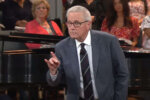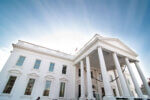Why an American family, despite paying the ultimate price, continues to engage in a conflict that isn’t their own.

The terrorist attack punctuated a spring day in Haifa, Israel, when a Palestinian suicide bomber blew himself up on a city bus full of children heading home after school. As usually happens in Israel after a terror attack, phones began buzzing with friends and family calling to check on the well-being of their loved ones.
Israel was in the throes of the second Palestinian uprising from 2001 to 2004. Residents lived daily with the threat of bombings and shootings in any metropolitan area. Tensions were palpable, security guards were hired at all public establishments—from post offices to supermarkets, and tourism was down drastically.
Philip and Heidi Litle were home sifting through photos of their children dressed for Purim, the biblical commemoration of the miraculous deliverance of the Jewish people recorded in the book of Esther, when the calls started coming in to their home. The Litles did a mental review of the whereabouts of their five children. They all should have been accounted for, not on the bus in question, according to initial news reports—which were rushed and inaccurate with a bevy of misinformation stemming from confusion at the scene.
“They finally got the first pictures, and then it was real clear,” Philip said. “When it became obvious that Abigail was [on her way home] and we saw pictures of the bus, we thought it was possible.”
After four of their children arrived home except for 14-year-old Abigail, Heidi started calling hospitals. One advised them to come since several victims, both wounded and dead, were yet unidentified. Another call came on their way to the hospital with the urgent message, “Yes, you need to come,” confirming Abigail’s presence there but not her condition.
That drive to the hospital on March 5, 2003, would end with receiving news that parents never want to hear. Abigail was among the 15 victims, mostly school-aged children, killed on that bus. Two more people died later of their injuries.
The Litles’ pastor, who had arrived at the hospital before them, identified Abigail and told the family.
“That was the way we got the news,” Philip Litle said. “We then had to go identify her ourselves.”
Philip and Heidi Litle paid the ultimate price for their decision to uproot their lives in America and move to Israel. Their mission to identify with the Jewish people took on a whole new significance when they lost a child in a terrorist attack.
Serving, Not Fleeing
Now, almost nine years removed from the tragedy that tore one of their children from them, the Litles have further settled in Israel rather than return to the relative safety of America.
The family’s grieving and healing process included entrenching themselves in the land they call home. The family applied for residency—a right due them as victims of terrorism; Heidi trained to be a medic and volunteered with the Israeli equivalent of the Red Cross; their children all have joined the army.
Josiah, the oldest, joined a combat unit. Hannah serves in Israel’s navy. Elishua took up fencing and duels with an Israeli national team. He and Noah, the youngest, will be drafted in the next few years.
“They all want to serve,” Heidi says. “They all think it’s the right thing to do.”
After losing one child to a war not their own, it wasn’t easy for the Litles to watch their children volunteer for the army—mandatory for citizens, but not incumbent upon residents. Despite that, Philip believes it is part of the family’s responsibility of living in Israel.
“I’ve enjoyed the protection of the state of Israel the whole time I’ve been here,” he says. “My children feel very much that they have enjoyed that and that it’s the right thing to serve what they see is their country. If other children serve to make me safe, then my children have no special privileges.”
They admit to enduring unnerving moments as their children have served, especially when Josiah was frequently deployed in dangerous territories.
“My trust isn’t in his ability or in the sophistication of the IDF [Israel Defense Forces], but it is in the Lord,” Philip says. “He can protect or He can choose, like with Abigail, to let evil strike. But in any case He is good and He is going to take care of them.”
The Litles’ extended family is supportive of their decision to live in what sometimes looks like a war zone.
“I don’t think it is easy for them. It is a difficult thing to have grandchildren so far away,” Philip says. “It was certainly extremely difficult when Abigail was killed. It’s also difficult for them to be far away. But … my mother has expressed many times that doing God’s will is the best thing to do. It doesn’t mean it isn’t painful; it’s just best.”
Living in the Jewish state, the Litles immersed themselves in the culture when they arrived for Philip’s studies in 1989. He received an MBA from Technion University. Their five children, three of whom were born in Israel, went to Israeli schools. All speak fluent Hebrew.
“We came with the purpose of being involved in connecting with the Jewish people and also with a heart for ministry to the Jewish people,” Philip recalls.
Within their first few years in the Holy Land, Philip was offered a position as head of the Baptist convention in Israel. He is currently the national director of Or B’Aretz (Light of the Land), an organization affiliated with Campus Crusade for Christ, and involved in discipleship and leadership development of the local body of believers. Heidi works with their local Messianic congregation Beit Eliyahu. Philip is originally from Missouri and Heidi from New Jersey.

The city of Haifa, where the Litles settled, is built on the coastal hill of Mount Carmel, where Elijah challenged and defeated the prophets of Baal by proving that the God of Israel is more powerful. The city, flanked by the Mediterranean Sea, is known for its integrated population of Jews and Arabs and a higher level of tolerance than most Israeli cities. Many Messianic congregations have flourished in the city and its suburbs.
The Litles moved to Haifa during the first intifada, or “uprising,” which began in 1987 and lasted until 1993, and was a time marked by fire-bomb attacks, rifle assaults and bombings. Family members were no strangers to the hazards of living in Israel.
Yet Philip explains the family’s decision to move to Israel during such a tumultuous season for the country: “It is very difficult to understand danger when you only hear about it. But if you believe in Israel like we do and you believe that God is at work here, then you have to ask yourself the question: ‘Do I believe in it enough that it could cost me personally?’”
The Litles counted the cost before they crossed the Atlantic, yet no one could have imaged that cost would be Abigail, the second child and eldest daughter, who was 7 months old when they arrived in Israel.
“We felt called to come here, called to tie our lives to the people. Abigail’s death is a part of the struggle,” Philip says. “It is something to be expected when you choose to identify with a people and live your life for their benefit.”
Three years after the suicide bombing that stole Abigail from them, the family endured, along with the rest of residents in northern Israel, a monthlong bombing campaign by Hezbollah terrorists in Lebanon. Many people lived in shelters during the daytime attacks, but Heidi volunteered as a medic.
“The previous trauma had made us a little callous to what was going on,” Heidi says. “Although there were rockets landing, we didn’t run into a shelter. I was working three shifts a week with an ambulance. We were definitely here and a part of what was going on.”
The issue with terrorism is to find a balance between being “sensibly cautious to secure yourself from the randomness, but on the other hand not to let fear control your life,” Philip explains.
He says that struggles such as theirs aren’t limited to Israel. Radical Islam, he notes, is an ideology focused on whose God is more powerful, and that plays out in the rest of the world as well.
“When God chose not to completely eliminate the Canaanites from the land [in Judges], … He wanted every generation to understand war,” he says. “We don’t have a desire to be engaged in actual physical combat, but this is a necessary thing for us to understand. We are in the midst of an ideological, spiritual war that is raging around us. Israel, because of its place in God’s plan, is at center of that.”
It’s not that Israel is perfect either, Philip notes. It is a secular nation with much unrighteousness. But it is at the heart of God’s purposes.
A Citizenship Bought With Blood
When Philip and Heidi returned from the hospital that night in March 2003, they sat down with their other children to share the devastating reality with them.
“I told them we’d been to the hospital and seen Abigail and that she was dead,” Philip recounts. “Then we read together from John chapter 11. It was a long night.”
Several days later, about 1,500 people turned up for Abigail’s funeral. Messianic believers and nonbelievers, neighbors, schoolmates, the mayor of Haifa and the American ambassador to Israel gathered at the Messianic cemetery in Haifa. An overcast sky turned to sunny skies over Abigail’s casket, which was draped symbolically with both the American and the Israeli flags.
Israeli Parliament Member Yuval Steinitz acknowledged the family’s sacrifice and how they had linked their fate with Israel’s. He welcomed them, and Messianic believers, as partners in Israel’s cause, a rare recognition by a public figure.
Many were touched by Abigail’s life and witness. Her parents describe her as a girl who was wise beyond her years, sensitive and a student who befriended those at school who were excluded.
Since then the family has grieved, each in their own way as father, mother, brothers and sister. Philip says the children tended to hide their emotions from them as the parents took their turns grieving and dealing with the pain. It has been a time of growing, trusting God and changing.
“Abigail was 14-1/2 years old when she died, and she still is 14-1/2 years old, and yet everyone else is older,” Philip says. “It’s really hard to not see her sometimes as being 22, which she would be.”
After Abigail’s death, Heidi put her feelings into words in an article titled, “Where Is God in the Midst of Tragedy?” published on Messianic.co.il. “These events that cause unfathomable destruction, waste and devastation provoke us to turn to God in desperation and ask Him hard questions,” she writes. “Through pain and sorrow, He is there inviting us to know Him.”
Heidi says she has gotten to the heart of God better through the pain of losing her daughter. She writes that “our hearts’ scream mirrors His, because it’s His image implanted on us that reacts and emphatically knows: This is just not the way it’s supposed to be!
“His conquering power is seen as He takes the fragments of the life that was and creates a new life—life with more understanding of who He is, who we are and what a relationship with Him is supposed to be like. Fight, struggle and find the true God—right in the midst of the tragedy.”
After about five years of having residency, the government of Israel granted the Litles citizenship in Israel because of their daughter’s death, a passport bought with blood.
“It has given me a greater appreciation of having my citizenship in heaven bought by blood,” Heidi says. “My citizenship here has been bought by blood.”
Nicole Schiavi is a freelance journalist based in Israel.
What Israel Cost Us
Messianic believers David and Leah Ortiz explain how much their family is willing to risk for their faith

On March 20, 2008, a bomb disguised as a Purim gift package was delivered to their door by a Jewish extremist. Their youngest son, Amiel, opened it, and the bomb detonated in his hands. Amiel miraculously survived the blast and dozens of operations since then, and the Messianic Jewish family’s witness has gotten only louder.
Charisma interviewed David and Leah Ortiz about what happened on the day their son almost died and how God has used their near-tragedy for His glory.
Charisma: You were very open about your faith in Ariel from the moment you moved there, but you were warned by believers and nonbelievers alike to keep your faith to yourself. What did you do?
David Ortiz: I said, “If the Jews don’t want me, I’ll go to the Gentiles.” I went to an Arab village with an Israeli friend. They beat us up, but we went back. Some of them became believers, but I didn’t know what to do with them. I wasn’t expecting them to multiply so quickly. When I started reaching out to the Palestinians, the people in Ariel got jealous. Then everything opened up with the Palestinians witnessing to the Jewish people and giving out Bibles in Hebrew.
Charisma: You were already no stranger to persecution. What sort of threats had you encountered on both the Israeli and Palestinian side?
David Ortiz: The [residents] did a demonstration in front of the house in Ariel, telling me we had to leave. We were warned to keep a low profile concerning Jesus. I kept telling my neighbors about Jesus anyway. Then there were demonstrations, posters; and people literally turned their backs on us. Regarding my work among the Palestinians, the Mufti of Jerusalem issued a fatwa [a religious edict] against me saying, “The head of David Ortiz should be removed from his shoulders.”
Charisma: The opposition culminated in the events of March 20, 2008. What happened then?
David Ortiz: My wife and I were in Jerusalem. I got a call from my son in the army telling me there was a bomb in Ariel. Then he called back to say it was on our street. My wife called Ami [Amiel]; he didn’t respond. She called our housekeeper, but the police answered the phone and said to go straight to the hospital. The secret police were waiting for us. They told us a bomb was planted in our house by radical Jews.
David Ortiz: The Lord showed me very quickly after that they wanted to kill us, damage us, erase us, but instead they critically wounded a 15-year-old boy who caught the heart of a nation and the world. When the doctor told us Ami might not make it, the truth is I didn’t receive that. All of a sudden I had an injection of faith that he was going to make it.
Charisma: How has your testimony changed since the bombing became national news?
David Ortiz: In the book of Jeremiah it says, “You will no longer go to them, but they will come over to you.” People come over to me now. People in Ariel that were avoiding me come up to me. In a horrible thing, God has glorified Himself.
The biggest testimony to Israel is that we have forgiven. We’ve been able to speak on national television that we are Messianic believers. People now know Messianic believers exist in this country and that we are a movement. Israelis are very curious about the faith. [The bombing] is nothing you’d ever choose to have happen, but our prayer since we came here is that name of Yeshua would be lifted up in this nation.







Leave a Comment
You must be logged in to post a comment.